Table of Contents
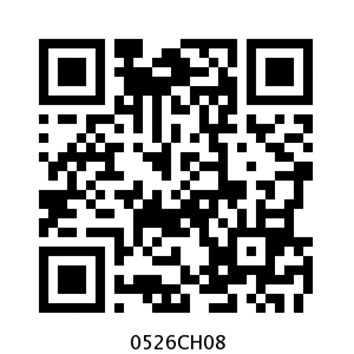
Unit 8 : Nobody’s Friend

Do you like making friends?
Do you like to share your things with others?
Do you think there is any child who has no friends?
Read on...
Read and Enjoy
She had some sweets that she wouldn’t share,
She had a book that she wouldn’t lend,
She wouldn’t let anyone play with her doll,
She’s nobody’s friend!
Read and Enjoy
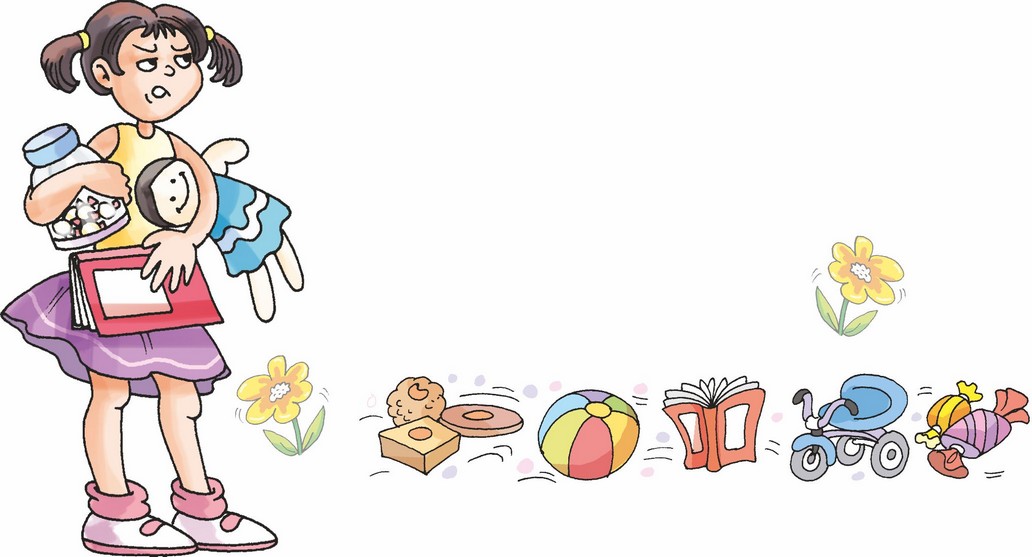

He had some toffee, and ate every bit,
He had a tricycle he wouldn’t lend,
He never let anyone play with his train,
He’s nobody’s friend!
But I’ll share all of my sweets with you,
My ball and my books and my games I will lend
Here’s half my apple and half my cake
— I’m your friend!
ENID BLYTON
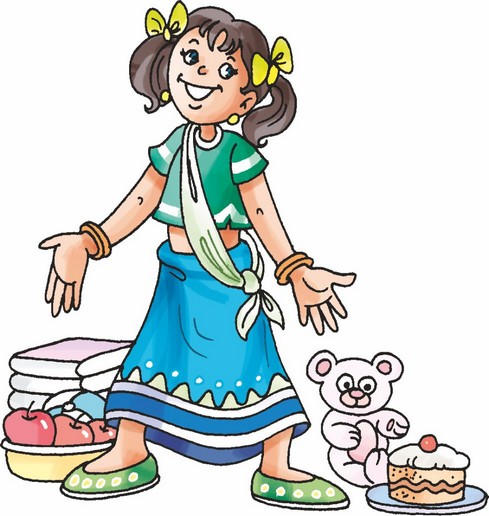
Reading is Fun
1. What are the things the girl does not want to share?
2. Did the boy share his toffee and tricycle with others?
3. Why are the two children nobody’s friends?
4. What does the child in the last stanza want to share?

Let’s Talk
1. Do you like to share your favourite food or toys with others? Why?
2. Who is your best friend? Can you describe him/her?
3. Suppose you and your friends were very thirsty and there was only one glass of water. What would you do?
4. If you had a bat, could you play cricket by yourself?
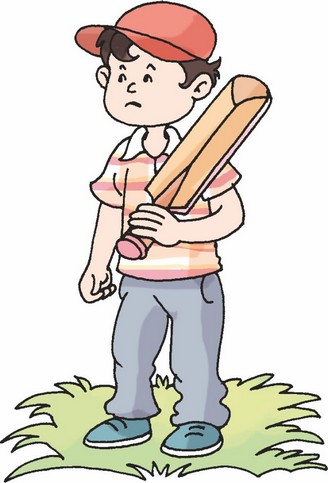
Word Building
1. Can you find more words ending with-less
friendless, homeless, _____
___________________________ _________________________________
2. Can you write the opposite of
(i) lend b _____ w
(ii) nobody s _____ y
What are no Words
1. Several words mean on. The word never is one. It means at no time or not ever.
Here are some other words read them
nobody | no | no where |
no one | none | nothing |
2. Read the given sentences and underline the no word in each.
(i) Nobody is at home.
(ii) Ram has no book.
(iii) Can no one help him?
(iv) Was Gopal nowhere around?
(v) None of the two boys came.
(vi) There is nothing to do.
(vii) I have no coat.
(viii) Radha is never late.
Say Aloud
nobody | everybody | somebody |
cycle | bicycle | tricycle |
share | care | stare |
hair | pair | stair |
Now write words that rhyme with
train _____ _____ _____
friend _____ _____ _____
Let’s Write
Here is a short story
Once a lion lay fast asleep in the Ranathambore forest of Rajasthan. Some mice were playing hide and seek near him. One mouse got trapped under the lion’s paw. The lion woke up, laughed loudly and let the mouse go!
After some days the mouse heard the lion’s roar. He saw that the lion lay in great pain as he was tied with many ropes. The mouse used his sharp teeth and cut the rope.
‘‘You are a true friend,’’ said the lion.
From Aesop’s Fables
A friend in need is a friend indeed.
What does this mean?
(i) We must be there for friends in trouble.
(ii) Only a good friend will be with us when we are in trouble.
In a short paragraph write how you can be a good friend.
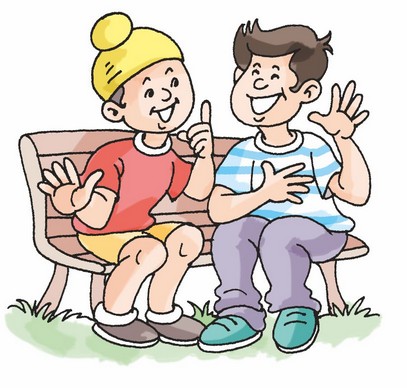
The Little Bully
Do you know of any child who teases others or pushes them around? What would you call such a child? Read this story and see how Hari, a little boy troubles other children.
Once upon a time, not so very long ago, there was a small boy called Hari. Although he wasn’t very big, he was strong, and he loved to tease all the boys and girls who went to school with him. What he loved to do was to pinch. He could make a big bruise in half a second. Another trick he played was pricking people with a pin.
So you can guess how all the children hated him. They tried pinching him back, but that was no good because he could always pinch harder. They didn't like telling their teacher, because that was telling tales.
It so happened that the class went for a picnic to the seaside for a whole day. All the children were most excited.
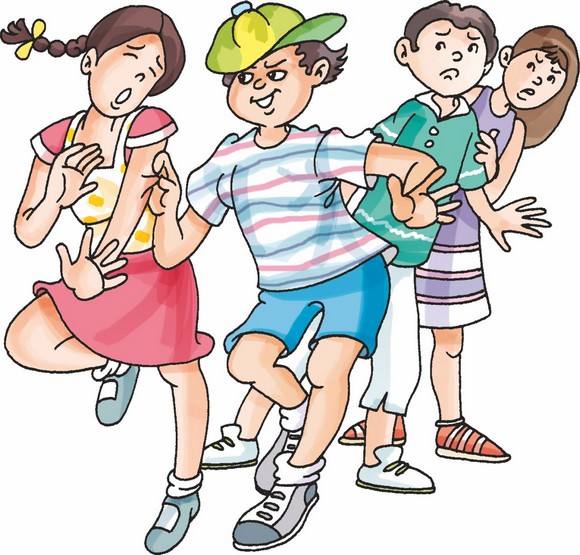
On that day, the sun shone bright, and all the children were wild with excitement. They crowded into the train and sat down — but nobody wanted to sit next to Hari because he always pinched.

When they arrived at the seaside, out jumped all the children with a shout of joy. Down to the sands they raced, hand in hand — but nobody took Hari’s hand. Nobody went near him.
Hari was angry. He went to a sandy corner near a rocky pool and sat down by himself. He took out his lunch and looked at it. It was a good lunch. There were two hard-boiled eggs, six jam sandwiches, three pieces of bread and butter, a ginger cake, and a bar of chocolate. He would eat it all by himself. He wouldn't offer anything to anyone!
Just as he was beginning on the eggs, he heard a hoarse voice near him. “Good morning! I am so pleased to meet a boy like you.” Hari turned around and stared in fright. Whatever do you think he saw?
Hari saw a monster crab walking sideways out of the pool. His eyes were on the ends of short stalks and he looked most queer. He held out his front claw to Hari. Hari put out his hand to shake the crab’s claw, but to his surprise and anger the crab opened his pincers and nipped his hand so hard that the little boy yelled.

“Ah, here is my good cousin,” said the crab pleasantly, and, to Hari’s horror, he saw a large sandy lobster crawling heavily out of the pool. Before the little boy could stop him the lobster took his hand in his great pincer-like claws and pinched it so hard that Hari yelled in pain.
Then he stared at the pool in surprise, for, out came sandy-coloured shrimps and prawns, more crabs, and another large lobster and they pricked Hari till he was soon black and blue with their pinching.
“Don’t you like it?” said all the creatures in surprise. “Why, we were told you would love to see us because you were a champion pincher and pricker yourself. Come, come join in the fun!”
Hari leapt to his feet, crying loudly. His lunch rolled into the pool, and when the crabs and lobsters saw it they ran to it and began to feast eagerly. Hari saw that they had forgotten him for a time, and he turned and ran for his life, tears streaming down his cheeks.
“They only did to me what I keep doing to the other children,” he thought. “But how it hurt! And how I hated those crabs and lobsters! I suppose the other children hate me too. Well, I jolly well shan’t pinch or prick any more.”
ENID BLYTON
(Adapted)
New Words
bruise : injury by blow to body
horrid : terrible
hoarse : rough and deep sounding
pincer : gripping tool
stalk : main stem
nipped : pinched
Reading is Fun
Now that you have read and understood the lesson, can you answer these questions? You can put a () on the right answer.
1. Why did all the children hate Hari?
(i) Because he would not talk to anyone.
(ii) Because he always pinched them.
(iii) Because he loved stealing their food.
2. “Nobody took Hari’s hand. Nobody went near him.
Nobody played with him.” This shows that Hari had
(i) many friends.
(ii) few friends.
(iii) no friends.

3. Which of the following actions would make a friendly person? Write them down.
- Respecting other people.
- Eating a small child’s tiffin.
- Calling people rude names.
- Pushing a smaller boy and making him cry.
- Being helpful to everyone.
- Helping your classmates in school.
- Mocking at friends and hurting their feelings.
- Protecting a weaker person.


Actions which would make a friendly person
_________________________________________________________
_________________________________________________________
_________________________________________________________
_________________________________________________________
_________________________________________________________
Vocabulary
1. Find out words which are opposites or are closest to being the opposites of the words given below. Then write down the opposites in the grid.
Down
1. smile
2. happy
4. strong
Across
3. quiet
5. punish
1. S _ O_ L
2. M_ S _ R _ _ _ E
3. _ O _S Y
4. W _ A _
5. _ E W A _ _
2. Hari was pinched till he was black and blue Black and blue’ means
(i) Hari fell down in pain.
(ii) there were bruises on his body.
(iii) Hari painted himself in colours.
(iv) Hari had a black and blue shirt.
3. ‘I shan’t pinch anyone anymore’. Shan’t means.
(i) shall
(ii) should
(iii) shall not
(iv) will not
4. Give the full forms of
won’t _____
weren’t _____
wouldn’t _____
couldn’t _____
5. A girl was sitting quietly beside him. Hari leapt to his feet, crying loudly.
The words quietly and loudly tell us how an action is being done.
Find five more words ending in -ly which denote how something is done.
(i) _____ ly
(ii) _____ ly
(iii) _____ ly
(iv) _____ ly
(v) _____ ly
Add -ly to the following words.
clear, merry, weary, double, dreary, bright, bad, fond
Now can you make sentences with these words?
_________________________________________________________________
_________________________________________________________________
_________________________________________________________________
_________________________________________________________________
_________________________________________________________________
_________________________________________________________________
Fun with Sounds
1. Let’s practice with P and F.
pleased | pricked | pinched | punished |
fat | fruit | fell | forgotten |
palm | pair | proud | parade |
farm | fare | frown | fish |
2. Complete the blanks with rhyming words of the following and practice aloud.
bruise c _____
carriage m _____
prawn d _____
creatures fe _____
teachers pr _____
vowed c _____
Let’s practice some Writing
1. How did the seaside creatures, the crab, the lobster etc. teach Hari a lesson? Write in a few lines.
_______________________________________________________
_______________________________________________________
_______________________________________________________
_______________________________________________________
_______________________________________________________

2. Read these sentences carefully.
I ate an apple.
A boy is standing under the tree.
The sun rises in the east.
A and an do not point out any definite or particular person or thing whereas,the is used when we speak of some particular person or thing. A,an and the are called articles.
Remember an is used before words beginning with a vowel a,e,i,o,u.
Now fill in the blanks with appropriate articles.
(i) Hari was _____ unpopular boy.
(ii) The boys and girls went to _____ seaside for a picnic.
(iii) He saw _____ big crab coming towards him.
(iv) I found _____ empty bottle, floating in the water.
(v) _____ sea creatures ate his food.
3. A crab has a hard shell whereas a frog does not have one. There are many animals that protect themselves from their enemies with their outer cover/shells/quills.
In the box given below are the names of some animals. Encircle the ones that can protect themselves with their hard cover.

Crocodile

Snail

Lizard

Snake

turtle
tortoise
gorilla
frog
hedgehog
porcupine
Now paste/draw the picture of any one animal. Write five lines about it.
__________________________________________________________
__________________________________________________________
__________________________________________________________
__________________________________________________________
4. Can you tell the difference between a turtle and a tortoise?
Write a few lines.

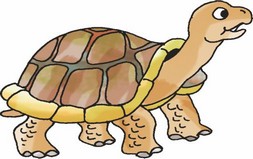
_________________________________________________________
_________________________________________________________
_________________________________________________________
_________________________________________________________
5. Describe what is happening in the picture. Use is/are and ____ing to make your sentences. Clues are given in the box.
swing, sit, climb, lick, slid, kick

For example Krishna is swinging.
(i) Mary _____ up the slide.
(ii) Hari _____ and boxing her.
(iii) Little Bitoo _____ a lollipop.
(iv) Rita _____ down the slide.
Imagine what the children will do in the playground tomorrow. You can take some hints from the words given in the box. e.g. John will kabbadi tomorrow.
Play, Football, Jump, race, badminton, run
Let’s be creative and Talk
Work in groups of four. See the picture of a shipwreck at the bottom of the ocean.
Suppose you went deep-sea diving. What would you find? Think of all the words that come to your mind, then build a a paragraph. Share your story with other groups.

Teacher’s Page ___________________________________________ UNIT 8
Poem: Nobody's Friend
Story: The Little Bully
THEMES
Problems of growing up
The evils of bullying
Friendship
Familiarity with the animal world
READING TIME
Reading of other stories by children's writers like Enid Blyton should be encouraged. Aesop’s Fables are also interesting for children, and should be suggested for their reading
CONVERSATION TIME
Discuss with the children the importance of rules in social situations and why these should be made and followed. Make them also aware of their fundamental rights and how they are inseparable from their fundamental duties. Let them list some of the rules they don't like to follow and to reason out why they also are important.
WRITING TIME
A paragraph is a group of sentences developing one topic. Choose a topic, make a plan, gather material and then construct the paragraph. Skills of paragraph writing on a proverb and collecting and presenting information on animals can be stressed upon. These can be put up on the display board.
PROJECT WORK
Let the children discuss about people they know and the things they like to collect. They can then talk about their own collections, how they started and what they like or would like to collect.
They could find out from the Internet or an encyclopedia about some famous people who are well known for their personal collections. This information should also be displayed for everyone to see.
